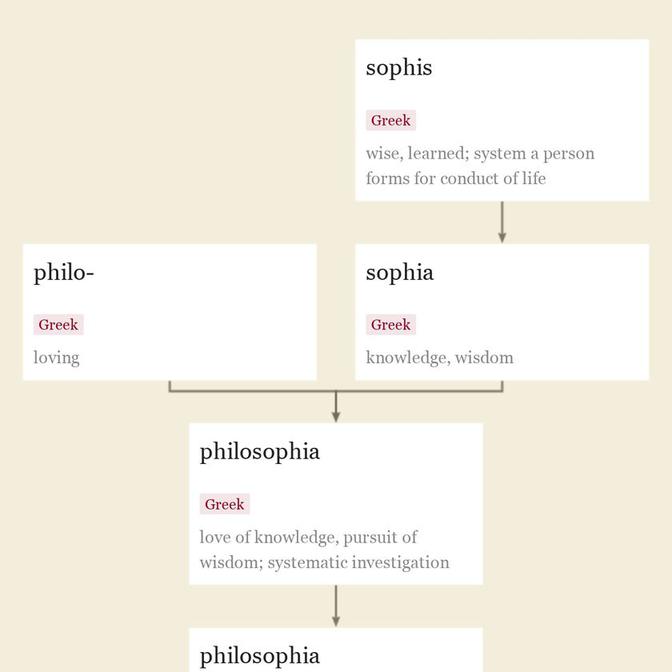philosophist (n.)
"a would-be philosopher," 一个对理性主义者或怀疑论者的贬义称呼,一个 philosophe; 1798年,源自法语 philosophiste; 参见 philosophy + -ist。
philosophist 的相关词汇
这个词缀表示“做某事的人”,也用于表示遵循某种信条或习俗,源自法语 -iste,直接源自拉丁语 -ista(西班牙语、葡萄牙语、意大利语 -ista 也源自此),源自希腊语代词后缀 -istes,该后缀来自于动词词干 -izein 的词尾 -is-,加上代理后缀 -tes。
变体 -ister(如 chorister, barrister)源自古法语 -istre,是基于 ministre 的错误类比。变体 -ista 源自西班牙语,在20世纪70年代被拉美革命运动的名称在美国英语中广泛使用。

公元1300年左右, philosophie,"知识,学问,学术著作,知识体系",源自古法语 filosofie "哲学,知识"(12世纪,现代法语 philosophie),直接源自拉丁语 philosophia,,又源自希腊语 philosophia "对知识的热爱,对智慧的追求; 系统的研究",由 philo- "热爱"(见 philo-)和 sophia "知识,智慧"组成,源自 sophis "聪明的,有学问的"; 这是一个起源不明的词语[Beekes]。中古英语中有许多拼写变体(filozofie, phelosophie 等)。
从14世纪中叶开始,它的意思是"处理理性思考或沉思的学科"; 从14世纪末开始,它也表示"自然科学",还有"炼金术,神秘知识"; 在中世纪,这个词被理解为包括所有推理科学。1771年有"一个人为生活制定的行为准则体系"的意思。现代意义上的"最高真理的体系,最基本问题的科学"的含义始于1794年。
Nec quicquam aliud est philosophia, si interpretari velis, praeter studium sapientiae; sapientia autem est rerum divinarum et humanarum causarumque quibus eae res continentur scientia. [Cicero, "De Officiis"]
Nec quicquam aliud est philosophia, si interpretari velis, praeter studium sapientiae; sapientia autem est rerum divinarum et humanarum causarumque quibus eae res continentur scientia. [西塞罗, "De Officiis" ]
In 1744 he made an unsuccessful attempt to obtain a professorship at Edinburgh; having failed in this, he became first a tutor to a lunatic and then secretary to a general. Fortified by these credentials, he ventured again into philosophy. [Bertrand Russell, writing of Hume, in "A History of Western Philosophy," 1945]
1744年,他曾试图在爱丁堡获得教授职位,但未成功; 在此失败后,他先是成为一个疯子的导师,然后成为一位将军的秘书。凭借这些资历,他再次涉足哲学领域。[伯特兰·罗素,在《西方哲学史》(1945)中写到休谟]
[Philosophical problems] are, of course, not empirical problems; but they are solved through an insight into the workings of our language, and that in such a way that these workings are recognized — despite an urge to misunderstand them. The problems are solved, not through the contribution of new knowledge, rather through the arrangement of things long familiar. Philosophy is a struggle against the bewitchment (Verhexung) of our understanding by the resources of our language. [Ludwig Wittgenstein, "Philosophical Investigations," 1953]
[哲学问题] 当然不是经验问题; 但是通过对我们语言运作的洞察来解决这些问题,以一种方式来认识到这些运作—— despite 一种误解它们的冲动。这些问题的解决不是通过新知识的贡献,而是通过对长期熟悉的事物的整理。哲学是一场与我们的语言资源所带来的迷惑(Verhexung)我们理解的斗争。[路德维希·维特根斯坦,《哲学研究》(1953)]
此外, philosoph,尤指法国百科全书派的启蒙理性主义者和怀疑论者,常常带有贬低或蔑视的意味(当信仰者使用时),1774年起源于法语 philosophe,字面意思是“哲学家”(古法语 filosofe; 参见 philosopher)。在英语中通常使用斜体,但由彼得·盖伊(1966年的《启蒙运动》)和其他人使其本土化。还可参考 philosophist。它也是英语中“哲学家”的旧词,从古英语一直延续到公元1400年左右。